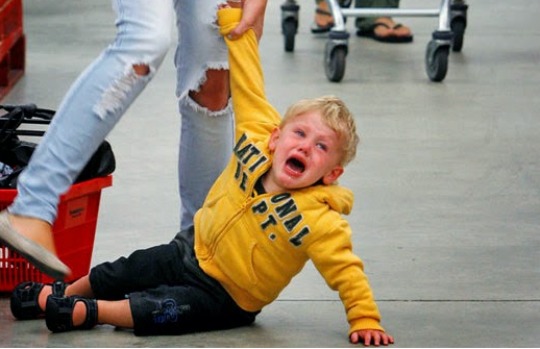
There is a lot of advice out there on toddler tantrums, what they are about, why they happen, how to raise children who don't tantrum (yeah, right) and on and on. We have had our fair share of experience in dealing with toddler tantrums ourselves, so these are things that have worked for us, and will hopefully work for you.
If the tantrum is just starting...
- If you can spot it coming on then distraction can sometimes stop the tantrum from starting in the first place. You can try ignoring the fact that their face is about to screw up in rage and point out something completely unrelated to what is upsetting them. "Wow! Look at that big bird/car/dog outside!" can work for me, along with grabbing him and taking him over to the window to see what's outside. They have been removed from the situation physically, and they are being presented with something exciting (that's down to you and your tone of voice), and they can sometimes forget about what they were doing before.
- Ignoring them. I'll be honest, this is tricky for me and it can just lead to a bigger meltdown, but for some it works wonders. You can try just walking into another room or carrying on with what they were doing, the theory being that they are seeing that their actions have no effect, so they stop. It's hard to do this when your instincts are to hold and comfort them, but if you remind yourself that they are crying through frustration rather than pain it's easier to try this route.
If it's a full on, throw themselves to the floor and scream tantrum...
- Make sure they are safe, and that there is nothing nearby them that they are going to hurt themselves on.
- Get down on the floor to their eye level, use eye contact, a calm voice and reassure them that everything is okay and that you are there.
- If you are in a public place ignore everyone else and focus on your child. Yes, people are looking and it's embarrassing, but all parents have had to go through this themselves and your child and yourself are the important ones in this situation. If you deal with a tantrum differently in public they are likely to continue for longer.
- Your child will take their cues from you, if you shout and get angry the tantrum will get worse.
- If they are throwing a tantrum because you have said no then do not give in and change your mind - they will just learn that their behaviour is getting them the results they want.
When they have calmed down...
- Hold them, talk to them. Tell them that you know that was really upsetting and not a nice way to feel. Don't scold them for it, they are looking for reassurance. Toddlers are acting out of frustration that the cannot communicate how they feel and what they want, not being 'naughty'.
- Don't reward a tantrum, and don't punish them for it either. It's a scary experience for them, as they are beyond reason and control for a time. They need comfort.
How to avoid tantrums...
- Try to recognise what triggers your child's tantrums, so that you can avoid those things or work around them. My eldest use to have a tantrum when we got him out of the bath, as he just wanted to stay in. Another parent who had the same problem made the end of bathtime into a game, using a big brown blanket so that they could pretend to be a bear. I used a fluffy dressing gown for my son in the same way and it worked. It's a very specific example, but what I am saying is that if you know something is likely to trigger a tantrum and you can't avoid it make a fun game out of it rather than it having a negative connotation.
The parenting experts say...
- Some experts advise providing plenty of outdoor and active play to allow children to 'let off steam' so that tantrums become less likely. We're divided on this, as being overtired can lead to more tantrums, so there's a fine balance to maintain.
- 'Positive Parenting' has been advised as something that leads to less meltdowns. Concentrate on praising good behaviour rather than only acknowledging the bad, saying "later" rather than "no"and so on.
- Giving children elements of choice through the day, so that they have some control themselves over which game to play, which snack to choose and so on.
Most children start to grow out of tantrums as their communication abilities grow, and they gain a better understanding of the world around them. If your child's tantrums are very extreme, or you feel that you cannot cope with them then it's best to contact your health visitor who will be able to offer individual help and support.
Although public meltdowns can be really embarrassing (school gates or the supermarket anyone?) remember that we have all been through this, and the parents who have noticed what is going on are probably feeling sympathy for your situation rather than judging you for it. Count to ten, take a deep breath and keep calm. We have all been there.






















Comments